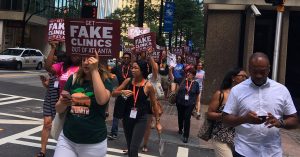Civil Liberties, Criminalizing Dissent, Human Rights, Political Prisoner, Targeting Muslims, War Resister
Podcast: Play in new window | Download
First Amendment: Separation of Church and State
On the final day of the Supreme Court term last week, Justice Elena Kagan said that conservatives are “weaponizing the First Amendment” and turning it into a sword.”
Many on the left who once held absolutist views on free speech are realizing that certain court victories may actually bring harm to women, or gay and lesbian couples and others, rather than advancing their causes. The same is true with some cases involving religious freedom.
The Washington DC-based group Americans United for the Separation of Church and State reads, in part on its website that: “Religion is often uses as an excuse to discriminate against LGBTQ people, women, religious minorities, non-believers and others. Some want to use their religious beliefs as as excuse to deny health care, refuse to provide goods and services, and disobey laws protecting Americans from discrimination.”
Guest – Attorney Richard Katskee, Legal Director at Americans United for Separation of Church and State. Richard has litigated First Amendment cases in appellate and trial courts throughout the country, including challenging creationism in the public schools, religiously based discrimination against same-sex couples and much more.
—-

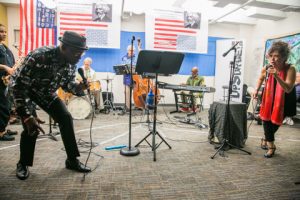
Alternative 4th of July celebration in NYC commemorated Frederick Douglass
Last week an Alternative 4th of July celebration in NYC commemorated Frederick Douglass an his Independence Day Speech at the Rochester Ladies’ Anti-slavery Society in 1852.
The event was organized by poet Raymond Nat Turner, who has been a guest on Law and Disorder, and held at the NY Chapter of the National Writers Union on July 3, 2018.
The celebration included performances by UpSurge! NYC, solidarity poems, and Frederick Douglass readers Ralph Poynter of the Lynne Stewart Organization and the New Abolitionist Movement, Margaret Kimberly from the Black Agenda Report, Diane Ward form the NWU Steering Committee and our own Heidi Boghosian. We are pleased to bring you some of the music, poetry and the readings.
———————–

———————–
Civil Liberties, Human Rights, Human Trafficking, Supreme Court, Truth to Power, War Resister
Podcast: Play in new window | Download
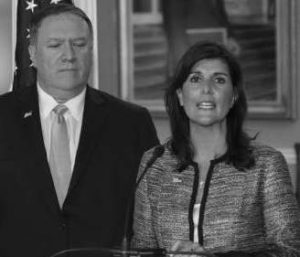

U.S. Quits UN Human Rights Body
Last week the United States of America became the first country to voluntarily quit the United Nations 47 member main human rights body, primarily over Washington’s claim that the Human Rights Council is biased against Israel.
This was the Trump administration‘s latest snub of the international community. The Human Rights Council is tasked with spotlighting and approving investigations of suspected rights abuses. Never before has a member dropped out voluntarily. Diplomats and activists say that US ambassador Nikki Haley was the driving force behind the decision.
Efforts by the United Nations ambassador Haley to end or water down the routine scrutiny of Israel has failed in recent months at the United Nations General Assembly in New York. The Human Rights Council addresses and array of concerns including discrimination, freedom of expression, the rights of women, LGBT people, and people with disabilities.
Haley declared that “We are withdrawing from the United Nations Human Rights Council, an organization which is not worthy of its name.“
Guest – Phyllis Bennis is a fellow of the Institute for Policy Studies, where she works on anti-war, US foreign policy and Palestinian rights issues. She has worked as an informal adviser to several key UN officials on Palestinian issues. Her books including Calling the Shots: How Washington Dominates Today’s UN, and Understanding the Palestinian-Israeli Conflict.
—-
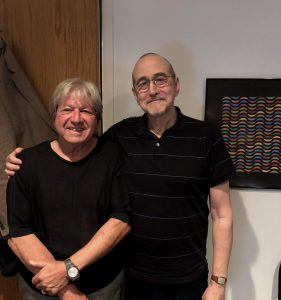
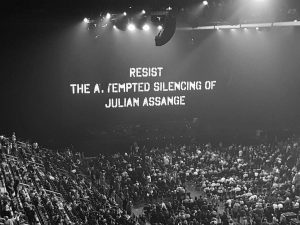
Mark Crispin Miller – Julian Assange, Voter Fraud and Fake News
WikiLeaks founder the truth telling publisher Julian Assange is in escalating danger of being sent from England to America where he would likely be tried for espionage, a crime that carries the death penalty.
Assange and WikiLeaks have revealed American war crimes in the middle east, CIA global machinations , and the work of Clinton Democrats in preventing the popular Bernie Sanders from heading up the party ticket.
Assange is presently holed up in the Ecuadorian embassy in London where he was granted political asylum six years ago by past leftist president Rafael Correa. But now, with the change of presidents in Ecuador, Assange has been cut off from the outside world. He has no phone, no computer, and no visitors.
The fresh offensive against him occurred the day after American General Joseph DiSalvo, the head of the US Southern Command, the Pentagon’s arm in Latin America, visited the new right wing Ecuadorian President Lenin Moreno. Moreno has said that Assange is “an inherited problem” and is seeking s better relationship with the United States government, to whom he has already granted a military base.
Guest – Mark Crispin Miller who is a professor of media studies at New York University. Professor Miller has frequently spoken about media propaganda, the engineering of consent for empire, fake news, and the destruction of the independent press. He has been awarded a Guggenheim Fellowship for the humanities and is a vigorous defender of Julian Assange and WikiLeaks.
—————————–

—————————–
Civil Liberties, Criminalizing Dissent, Human Rights, Surveillance, Truth to Power, War Resister
Podcast: Play in new window | Download
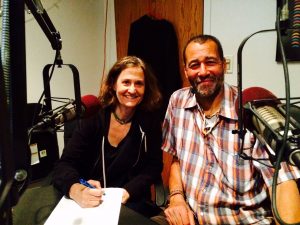
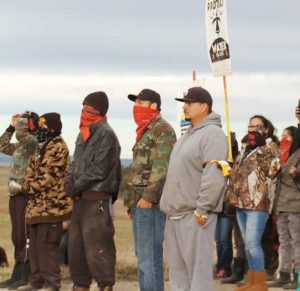
Legislation Criminalizing Protests
Throughout the nation, a rash of new bills are being introduced that increase the criminal penalty for the act of protesting. They have been in part inspired by the high-profile protests at Standing Rock, and also by model legislation drafted by the conservative and influential American Legislative Exchange Council. ALEC’s bills are designed to protect corporate interests. A new report from Greenpeace USA reveals how Energy Transfer Partners or ETP, the company behind the Dakota Access pipeline, with the fossil fuel industry, lobbied for legislation aimed at restricting and criminalizing protest. The report finds abuses on human rights, freedom of speech and faulty operations from the company.
ETP practices are destructive for the planet, for communities and for the health of democracy in the US. They have hired private security firms that surveil and infiltrate activist groups, advocated for laws that restrict the right to protest, or moving forward with pipeline projects against the will of Indigenous people and landowners, ETP is the poster child for unchecked corporate power. Annie Leonard, Executive Director at Greenpeace USA calls their projects lightning rods for controversy.
The report, Too Far, Too Often: Energy Transfer Partners’ Corporate Behavior On Human Rights, Free Speech, and the Environment, details how ETP lobbied for anti-protest legislation. It also shows how the company uses the courts and Strategic Lawsuits Against Public Participation (SLAPPs) to intimidate opponents of the Dakota Access pipeline project. In August 2017, ETP sued Greenpeace entities and others for USD $900 million, using RICO laws to claim that a collection of environmental groups and Indigenous allies constituted a criminal enterprise.
Guest – Attorney King Downing, seasoned civil liberties lawyer who has worked with activists for decades. King is the National Mass Defense Coordinator at the National Lawyers Guild.
—-

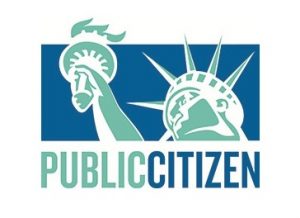
Big Pharma 101 and Affordable Prescriptions Made by Advancing the CREATES Act
It is estimated that the United States spends more than $500 billion dollars on prescription medicines each year. Total spending on drug therapies is about $371 billion dollars, including over-the-counter drug remedies, valued at 31 billion. A poll by the Kaiser Family Foundation found that 76% of Americans overall – and across party lines – say their top health care priority is ensuring that high-cost drugs for chronic conditions, such as HIV, hepatitis, mental illness and cancer, are affordable.
In a long overdue move, the U.S. Senate Judiciary Committee recently voted to advance the CREATES Act. It would prevent prescription corporations from abusing regulatory rules to deny generic medicines and biosimilar manufacturers access to product samples that allow these groups to obtain U.S. Food and Drug Administration approval and bring affordable products to market.
Corporations have long used this practice to delay the introduction of price-lowering generic and biosimilar competition. Brand-name manufacturers use it to inappropriately extend their monopolies. The Act aims to curb these abuses and promote competition. The U.S. Congressional Budget Office claims the Act will save $3.8 billion over the next 10 years.
Americans overwhelmingly support disciplining Big Pharma to help rein in pharmaceutical prices. The DC based group Public Citizen says that the CREATES Act begins to do that and cites it as a key structural reform that we can pass this year. It urges Congress should pass this legislation without delay.
Guest – Steven Knievel, Steven Knievel is a researcher and campaign organizer with Public Citizen’s Global Access to Medicines Program. He works with governments and public interest groups around the world to promote the use of flexibilities in patent and trade rules to promote access to medicines for all. He also works to mitigate the deleterious effects of corporate influence in trade negotiations on public health.
———

Academic Freedom, CIA Sponsored Terror, Civil Liberties, Criminalizing Dissent, Gaza, Human Rights, Targeting Muslims, Torture, War Resister
Podcast: Play in new window | Download


Mark Crispin Miller – Julian Assange, Voter Fraud and Fake News
WikiLeaks founder the truth telling publisher Julian Assange is in escalating danger of being sent from England to America where he would likely be tried for espionage, a crime that carries the death penalty.
Assange and WikiLeaks have revealed American war crimes in the middle east, CIA global machinations , and the work of Clinton Democrats in preventing the popular Bernie Sanders from heading up the party ticket.
Assange is presently holed up in the Ecuadorian embassy in London where he was granted political asylum six years ago by past leftist president Rafael Correa. But now, with the change of presidents in Ecuador, Assange has been cut off from the outside world. He has no phone, no computer, and no visitors.
The fresh offensive against him occurred the day after American General Joseph DiSalvo, the head of the US Southern Command, the Pentagon’s arm in Latin America, visited the new right wing Ecuadorian President Lenin Moreno. Moreno has said that Assange is “an inherited problem” and is seeking s better relationship with the United States government, to whom he has already granted a military base.
Guest – Mark Crispin Miller who is a professor of media studies at New York University. Professor Miller has frequently spoken about media propaganda, the engineering of consent for empire, fake news, and the destruction of the independent press. He has been awarded a Guggenheim Fellowship for the humanities and is a vigorous defender of Julian Assange and WikiLeaks.
—-
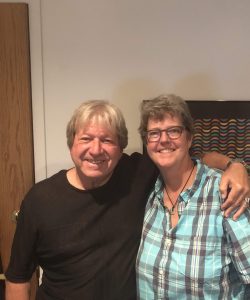
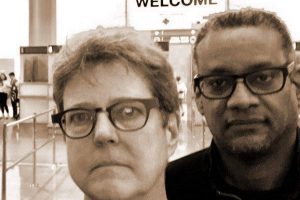
CCR Delegation To Israel
Like the USA, Israel is a colonial-settler state which, beginning in 1948, 70 years ago, expelled 750,000 native Palestinians, took their land, homes and businesses, and reduced those who remained to abused second class citizens, not unlike what was done to native Americans by white settlers in the USA. Their land was stolen, their tribes uprooted, and their culture practically destroyed.
In 1967 Israel expanded further, militarily occupying Palestinian territories to their north, east, and south, including East Jerusalem.
Last month Attorney and Columbia law professor Katherine Franke, the Chair of the Board of Trustees of the CCR, along with Attorney Vince Warren, the CCR’s Executive Director, headed up a 20 person delegation of American activists who traveled to Israel to report on the human rights situation there. Franke and Warren never made it past the airport in Tel Aviv. They were stopped, questioned , detained for 14 hours, and then deported back to the USA. Franke was told she could never return.
Guest – Attorney Katherine Franke, is the Sulzbacher Professor of Law, Gender, and Sexuality Studies at Columbia University, where she also directs the Center for Gender and Sexuality Law and is the faculty director of the Public Rights/Private Conscience Project. She is a member of the Executive Committee for the Institute for Research on Women, Gender and Sexuality, and the Center for Palestine Studies. She is among the nation’s leading scholars writing on law, religion and rights, drawing from feminist, queer, and critical race theory. She is the author of Wedlocked: The Perils of Marriage Equality. Her next book will be coming out from Haymarket Press in the spring: Repair: Slavery’s Unfinished Business makes the case for racial reparations in the U.S.
Civil Liberties, Criminalizing Dissent, Human Rights, Supreme Court, Truth to Power, War Resister
Podcast: Play in new window | Download
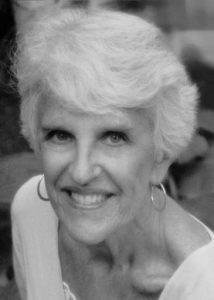
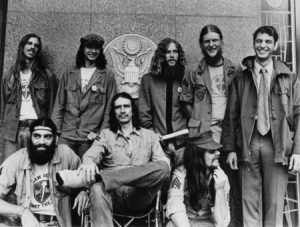
Lawyers You’ll Like: Attorney Nancy Stearns
In 1970, an unusual legal team came together in what would become a landmark case challenging New York’s restrictive abortion ban. The case was Abramowicz v. Lefkowitz, and the team consisted of all women, many of whom had just a few years of legal practice. The premise was equally unusual at the time: its critical testimony came directly from women who had had illegal abortions, lack of contraceptive access, and painful experiences either from adoption or forced motherhood.
One of those attorneys included Nancy Stearns. After the Abramowicz case influenced the state’s passage of the nation’s most liberal abortion law before Roe v. Wade, Nancy would go on to bring successful challenges to abortion laws in NJ, CT, RI and MA.
Nancy attended law school after working with the Student Nonviolent Coordinating Committee (SNCC) in Atlanta. For 12 years at the Center for Constitutional Rights she worked on a number of significant civil rights cases, including challenging New York City’s mandatory pregnancy leave policy in Monell v. Department of Social Services that resulted in a Supreme Court ruling that municipalities are liable for damages under 42 U.S.C. 1983. She represented members of Vietnam Veterans Against the War in a federal criminal conspiracy prosecution arising from anti-war protests, and she litigated to reunite families separated by the Babylift, in which Vietnamese infants and young children were brought to the U.S. for adoption at the close of the Vietnam War, despite having living parents.
Nancy is also an accomplished cabaret singer, making the circuit in New York City. She is a longtime member of the National Lawyers Guild; in fact the Guild’s Chapter is honoring Nancy and her exemplary career at its annual Spring Fling on June 8, 2018.
—-

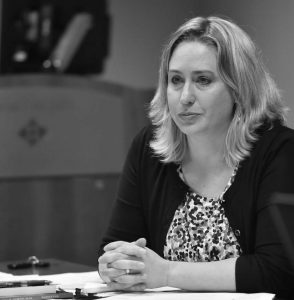
Cryptocurrencies
In 2008, Satoshi Nakamoto invented Bitcoin, the first and most prominent cryptocurrency, a peer-to-peer electronic cash system. While cryptocurrencies have become an international phenomenon, and many are aware of their importance, yet they are still not completely understood by large financial institutions, governments and much of the public. There are currently more than 1,500 cryptocurrencies, and the list continues to grow.
The general definition of cryptocurrencies are digital currencies using encryption techniques, hence the prefix crypto, to regulate the generation of unites of currency and verify the transfer of funds. This system operates independently of a central bank to create and outlet for personal wealth beyond restriction and confiscation. The U.S. Securities and Exchange Commission recently announced that it will be requiring digital asset exchanges to registers with the agency.
Guest – Professor Angela Walch teaches at St. Mary’s University School of Law. Her research focuses on money and the law, blockchain technologies, governance of emerging technologies and financial stability. She is a Research Fellow of the Centre for Blockchain Technologies of University College London. Walch was nominated for “Blockchain Person of the Year” for 2016 by Crypto Coins News for her work on the governance of blockchain technologies and her influential article in American Banker arguing that the coders and miners of public blockchains should be treated as fiduciaries.
——————

——————
Academic Freedom, Civil Liberties, Criminalizing Dissent, Human Rights, Truth to Power, War Resister
Podcast: Play in new window | Download

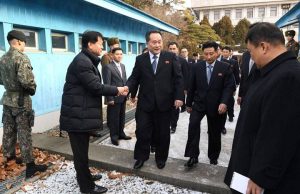
North and South Korea Diplomacy
In a historic diplomatic break-through the leaders of North Korea and South Korea met earlier this month. The North Korean leader Kim Jung-Un promised to give up his country’s nuclear weapons declaring that its not necessary to have them if the United States formally ends it’s provocations and promises not to launch any military aggression against his country. He promised that North Korea will dismantle is nuclear test site in Punggye-ri in May.
The Korean War which began in 1950 came to an end in 1953. An armistice was signed but peace was never officially declared and the two countries have been officially at war ever since.
This state of affairs will hopefully be resolved. At the meeting, South Korean President Moon Jae-in embraced North Korean leader Kim Jong-un after signing the Panmunjom Declaration for Peace, Prosperity, and Unification of the Korean Peninsula.
Guest – Attorney Jim Lafferty is one of the leaders of the anti-Vietnam War movement and has remained a peace activist for five decades. Jim Lafferty is currently the head of the Los Angeles chapter of the National Lawyers Guild and an organizer of and speaker at last week’s Los Angeles teach-in on the Korean situation.
—-
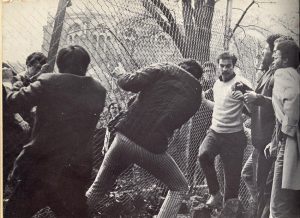

Columbia University Protests of 1968: Fifty Years Later
1968 was a momentous year. Huge historical events happened in the USA, Latin America, Europe, and Asia fifty years ago that shaped the course of history.
In France the students and workers came close to overthrowing capitalism in an advance capitalist country.
In Eastern Europe the Czechoslovakian people would’ve installed a democratic socialism, what they called socialism with a human face, but for the intervention by the power of Soviet Union which sent in troops to crush the uprising.
In Vietnam, the American war effort to prevent the Vietnamese people from determining their own destiny showed the world to be a losing proposition by the Tet Offensive. The Vietnamese National Liberation Front and the Hanoi coordinated military strikes throughout the south of their country, temporarily took over the southern capital of Saigon including the American Embassy.
Martin Luther King Jr. was assassinated in Memphis, Tennessee on April 4, 1968 provoking rebellion in the inner cities of the USA. Two weeks later the students, both black and white, rose up at Columbia University in New York City.
The African-American students demanded that the university stop encroaching in neighboring Harlem, where the university was planning to build a gymnasium for its students in a public park. They took over Hamilton Hall, a classroom building on the campus and received wide support from the Harlem community. The white students supported this demand. They took over four other buildings, including the administration building (Lowe Library) demanding that the University end its complicity in doing research that supported the American imperial war in Vietnam.
After a week of the student occupation, the New York City Police on behalf of the administration descended on the campus, violently beat the students, and arrested some 700 of them. They were defended by members of the National Lawyers Guild. After the arrests, the students went on strike. In the end the university’s complicity with the war in Vietnam and it’s landgrab in Harlem were ended.
Guest – Attorney Eleanor Stein, she was a law student at Columbia at the time and a participant in the student strike. She teaches a course called the Law of Climate Change: Domestic and Transnational at Albany Law School and SUNY Albany, in conjunction with the Environmental and Atmospheric Sciences Department at SUNY. Eleanor Stein is teaching transnational environmental law with a focus on catastrophic climate change. For ten years she served as an Administrative Law Judge at the New York State Public Service Commission in Albany, New York, where she presided over and mediated New York’s Renewable Portfolio Standard.
Guest – Professor Stefan Bradley whose primary research area is recent African-American history. He is the author of Harlem versus Columbia University: Black Student Power in the Late 1960s. Professor Bradley teaches at Loyola Marymount University in Los Angeles and is the chairperson of the African American studies department. He was a much appreciated participant in last weeks conference on the Columbia strike.
—————————————-
